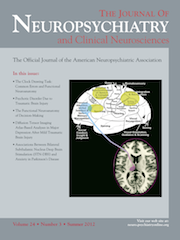Effects of Sleep Deprivation on Nocturnal Cytokine Concentrations in Depressed Patients and Healthy Control Subjects
Abstract
Previous studies have reported alterations of cytokine and cytokine-receptor concentrations in psychiatric patient populations, including patients with major depressive disorder (MDD). However, study results are conflicting, and possible causes for these abnormalities are unknown. Since sleep deprivation may induce a rapid improvement of mood in depressed patients, the authors investigated the impact of total sleep deprivation (TSD) for one night, and subsequent recovery sleep, on nocturnal concentrations of interleukin-6 (IL-6), interleukin-1-receptor antagonist (IL-1RA), and soluble IL-2 receptor (sIL-2R) in 15 unmedicated patients with MDD and 16 healthy volunteers. Whereas IL-6 levels normalized again during the recovery night in depressed patients, they were still elevated in control subjects. Serum levels of IL-1RA were higher in depressed patients than in controls, but were not affected by TSD. During recovery sleep, IL-1RA levels increased as compared with the preceding TSD night only in controls. Responders (N=8) differed from nonresponders (N=7) to TSD with regard to IL-1RA, which increased significantly during TSD in responders only. Sleep deprivation therefore seems to significantly affect cytokine levels in both depressed patients and healthy subjects, but does so in different ways. Sleep disturbances in depressed patients could account for the increased levels of cytokines found in these patients in several previous studies. The interaction between antidepressant effects of TSD and alterations of cytokines warrants further investigation.



